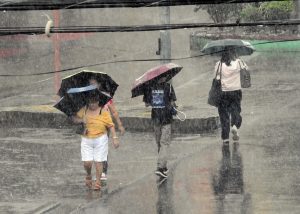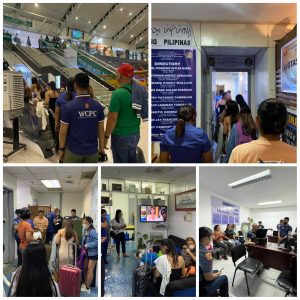 DAVAO CITY (MindaNews) – Three persons in the Davao Region have tested positive for the more infectious COVID-19 UK variant or B.1.1.7, two of them in Davao de Oro and one in Davao City, officials confirmed on Saturday.
DAVAO CITY (MindaNews) – Three persons in the Davao Region have tested positive for the more infectious COVID-19 UK variant or B.1.1.7, two of them in Davao de Oro and one in Davao City, officials confirmed on Saturday.
This is the first reported presence of the UK variant in Mindanao.
But health and local government officials withheld vital details about the three cases, despite persistent prodding by journalists.
The Province of Davao de Oro, in a statement posted on its Facebook page shortly after 7 p.m. Saturday confirmed two of the three cases are from their province – a 33-year old male from Compostela Valley town and a 54-year old female from New Bataan.
Compostela Valley and New Bataan are adjacent towns.
Dr. Ashley Lopez, acting head of the City Health Office, merely confirmed that one of the three cases is in Davao City but gave no other details. “No further comments as of now. We are still conducting bio-surveillance,” he said.
But the DOH central office on Friday night said a 10-year old male, a 54-year old male, and a 33-year old female from the Davao region were among the 19 additional cases infected with the UK variant, bringing the total to 44 in the country as of Friday.
Since the 33-year old and 54-year old are from Davao de Oro, the Davao City case, based on the DOH central office advisory, is a 10-year old male. How the boy contracted the disease and what his case profile is, Lopez has yet to say.
The Province of Davao de Oro’s statement said the two cases “have no known link with each other” and have been under strict isolation “since their swab test results came out positive earlier this month.”
But Michael Uy, Philippine Information Agency’s Infocen Manager in Davao de Oro, told reporters in a chat group that according to the Emergency Operations Center (EOC), the two tested positive for COVID-19 “January pa” (in January).
When in January, Uy did not reply.
The Davao region’s first COVID-19 case recorded in mid-March last year was a 21-year old female from Davao de Oro who returned home from work in the United Kingdom with a layover in Doha, Qatar, and from Manila, flew to Davao City on February 29.
Not ROF
Citing EOC data, Uy said the two cases are not returning overseas Filipinos (ROFS) and have no travel history to areas with confirmed cases of COVID UK variants.
“Padayon ang contact tracing kung asa nila nakuha (Contact tracing is still ongoing to determine how they contracted the disease),” he said.
According to the EOC, Uy said, the patient from New Bataan “tested negative in the latest swab.” He said the patient spent more than 21 days under quarantine and is now on home quarantine but the DOH said he should be returned to a quarantine facility.
The patient from Compostela Valley, he added, is “still positive in the latest swab.”
When the “latest swab” for the two patients was done, there was no reply.
The province’s statement said they are doubling efforts “in tracing their close contacts up to the third degree (F3 close contacts) and placing them under quarantine.”
The statement added that the presence of the UK variant “proves that COVID-19 cannot be defeated overnight.”
“Let’s stay home if we don’t have any essential tasks outside. If going outside is necessary, always remember to wear a face mask and face shield, maintain physical distancing of at least one meter, and always wash your hands with soap. Let us also avoid meetings and gatherings of any forms for the time being,” it said.
It recommended that meetings be held online.
Details withheld
The DOH regional office in Davao (DOH-XI) and the City Health Office in Davao City have not released to the media the case profiles of the three patients.
DOH-XI issued a three-paragraph statement shortly before 2 p.m., that gave no details, not even the age and gender of the patients, despite the fact that the DOH central office had provided that information Friday night.
The statement raised more questions as it did not include basic data that should have been made available to the public: In what areas are these three positives? Are all three coming from only one area, two areas, or three different areas? When were these positives detected? What are their case profiles? Are they returning overseas Filipinos (ROFs), locally stranded individuals (LSIs), residents who never left their areas? How many close contacts of these positives have been traced and how soon were they contacted? How many of their close contacts also tested positive?
The DOH-Davao statement said that with the detection of three B.1.1.7 cases in the Davao Region, officials from the central and regional offices, called for an emergency meeting with local government units to come up with a coordinated response. Even the date of the meeting was not disclosed in its statement.
The Province of Davao de Oro statement said they were notified about the two cases of COVID-19 UK variant in their province on Saturday morning.
The DOH-XI statement said local health authorities are undergoing an intensive investigation and contact-tracing up to the third generation or F3 close contacts, and are planning to subject them to reverse transcription-polymerase chain reaction (RT-PCR) tests.
“Specimens that tested positive will be reviewed and selected samples that passed the laboratory criteria will undergo the whole genome sequencing at the University of the Philippines – Philippine Genome Center (UP-PGC). The identified close contact will also undergo strict quarantine,” it said.
As of February 12, DOH-Davao Region reported 147 new cases, bringing the total cases to 18,800, with 2,592 active, 15,439 recoveries, and 769 deaths in the region.
Out of the total, Davao City, which reported the highest COVID-19 cases in Mindanao, tallied 12,367 cases, with 1,313 active, 10,460 recoveries, and 594 deaths. Davao de Oro reported 1,038 cases, Davao del Norte with 2,703, Davao del Sur with 1,298, Davao Occidental with 211, and Davao Oriental with 1,183. (Carolyn O. Arguillas with a report from Antonio L. Colina IV / MindaNews)




